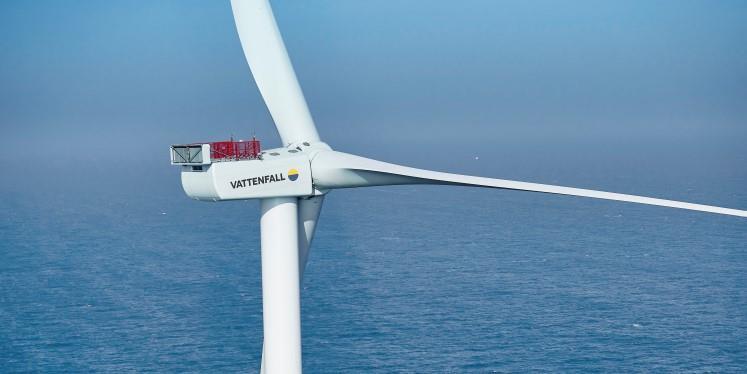
Vattenfall has called off its development of the UK offshore wind power project Norfolk Boreas due to rising costs, prompting industry leaders to call for government support for the secotor.
The company said in its half-year report: “This development affects future profitability and means that Vattenfall makes an impairment for wind power in Norfolk, UK, with a total impact on earnings of SEK 5.5 billion.”
Vattenfall has confirmed that it “decided to stop the development of Norfolk Boreas in its current form” and will “examine the best way forward for the entire Norfolk Zone.”
The Norfolk zone also includes Vattenfall’s Norfolk Vanguard project.
Vattenfall told its shareholders in its second quarter results: “Although demand for fossil-free electricity is greater than ever, the market for offshore wind power is challenging.
“Higher inflation and capital costs are affecting the entire energy sector, but the geopolitical situation has made offshore wind and its supply chain particularly vulnerable.
“Overall, we see cost increases up to 40%.”
‘Significant setback’
The Opergy Group, a Norfolk headquartered consultancy in the UK’s clean energy sector, has labelled Vattenfall’s announcement as a “significant setback” for the country’s wind power.
Managing director of the group, Johnathan Reynolds, said: “The decision comes as a blow to the UK’s renewable energy ambitions and has far-reaching negative impacts on the UK supply chain and job market.
“Vattenfall’s decision, driven by rising costs, has created a significant setback for the development of offshore wind power in the Norfolk region, and the UK.”
Mr Reynolds added that the cancellation “deals a severe blow to the region’s potential for job creation, stifling economic progress at a time when it is needed the most.”
Angus Walker, a partner at the law firm BDB Pitmans who specialises in large energy infrastructure projects has also waded in on the discussion.
Mr Walker said: “It is disappointing that Vattenfall is halting development of one of the UK’s largest offshore windfarm due to rising costs.
“‘Planning’ is often blamed for delays but there are many other reasons, as in this case. Given the government’s challenging target of 30GW of offshore wind capacity by 2030 this also demonstrates that a much greater pipeline than 30GW is needed as some projects will fall by the wayside.”
Calls for government to take ‘immediate action’
Opergy Group’s managing director says that the problem of inflation is one shared by Vattenfall’s competitors as the whole offshore wind sector is being hit with rising costs.
Mr Reynolds said: ““Vattenfall’s statement in its second-quarter results underscores the challenges faced by the offshore wind sector.
“Higher inflation and capital costs, coupled with geopolitical uncertainties and lack of political incentives, have made offshore wind and its supply chain particularly vulnerable.”
Opergy believes that Rishi Sunak’s government needs to take “immediate action to address the issues plaguing the offshore wind sector.”
Mr Reynolds added: “As the industry faces mounting challenges, it is crucial that the government demonstrates its commitment to renewable energy and provides the necessary support to ensure the continued growth and success of projects like Norfolk Boreas.”
“We urge the government to work closely with industry stakeholders to create a stable and favourable investment environment.
“This should include measures to address the rising costs and supply chain vulnerabilities highlighted by Vattenfall.
“By doing so, the government can safeguard the UK’s energy transition, protect jobs, and bolster the nation’s position as a leader in offshore wind power.”
Continued pressure for the government to ‘step up’
Renewable UK also called for government intervention, saying: “We need a stronger industrial strategy for the sector, which the Chancellor should support with new measures in the Autumn Statement as a matter of urgency.”
Chief executive of Renewable UK, Dan McGrail, continued: “Even with these cost increases, offshore wind still remains the lowest cost way of generating new electricity.
“That’s why international competition for skills and supply chain is continuing to intensify, with the US and EU setting attractive incentives to try to lure renewable energy companies away from the UK and lead the global market.
“The Government needs to step up with a robust response to enable industrial growth throughout Britain.”
Scottish Renewables has also said that the Vattenfall announcement should serve as a “major wake-up call for the UK Government who are failing to take account of the increased cost pressures and economic challenges facing offshore wind developers.”
The Scottish Renewables chief executive, Claire Mack, wonders if projects in England are halting due to cost constraints, the impact is bound to come for project further north as they “are more expensive to operate than those elsewhere in the country.”
He added that Scottish projects as “clearly even more vulnerable to these cost pressures.”
Mr Mack says: “The UK Government needs to urgently review its investment framework for offshore wind and recognise the heavier costs on projects here in Scotland or they face losing this once in a lifetime opportunity to enable the best projects to achieve their net zero and industrial growth ambitions.”
Looking back to Norfolk Boreas’ approval
In late 2021 the huge Norfolk Boreas wind farm was given the green light by the UK Government.
At the time of its approval, Vattenfall said the development held the potential to power almost two million UK homes.
More than 80 parish councils across Norfolk had banded together in objection to the wind farm over concerns to the environment, towns and villages as underground cable works get underway.
However, Vattenfall defended its project saying the 1.8gigawatt (GW) project, 45miles from shore, would bring a “wealth of supply chain opportunities” to the region.
Recommended for you

